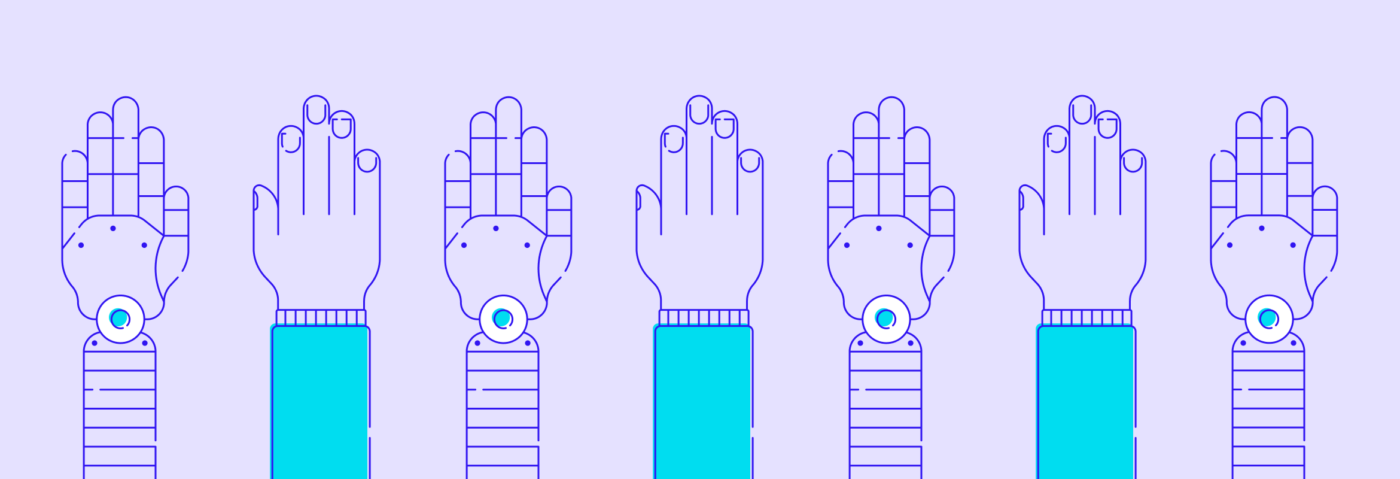
Benefits and Risks of ChatGPT in Customer Service
Simplr’s data science team identifies the biggest risk of ChatGPT in customer service (and how to work around it).
Like most of the technology world, our data science team has been playing extensively with ChatGPT. The tool truly is revolutionary and will certainly make a lot of traditional machine learning (ML) obsolete.
At Simplr, we use artificial intelligence and human labor to help businesses create better customer experiences. Naturally, ChatGPT is top of mind as we begin to blend existing technology and customer service strategy with ChatGPT’s dialogue-based capabilities.
The AI team at Simplr had been following the development and testing of Large Language Models (LLMs) and other generative approaches for a while. The release of chatGPT has confirmed and expanded the variety of use cases we had in mind for customer service applications.
(Please note that at the time of this writing, chatGPT isn’t available for use outside of their own website. Our team has taken a head start on developing and training our own generative models on our proprietary customer service specific data – remember that our human cloud helps us gather very high quality data across a wide range of inquiries and industries.)
But given the mind-blowing samples we have seen in the press – like ChatGTP passing the Bar Exam– many CX leaders are rightfully wondering: will chatGPT replace all customer service agents?
The answer depends on your CX standards :). For us, the answer is no way! While we believe institutions not using ChatGPT will be left behind and are heavily investing in chatGPT-like approaches, we are seeing major limitations to letting such models handle customer interactions freely and directly.
As the use cases roll out, it’s becoming clear that ChatGPT is an incredible tool, but it’s imperative to know its strengths and weaknesses within a customer service context.
Let’s take a closer look.
The benefits of ChatGPT in customer service
- ChatGPT is an excellent way to supercharge agents’ productivity. Does a customer question fall outside of your knowledge base? Let ChatGPT provide a suggestion that the human agent can use as a base. ChatGPT can also leverage the unique way to connect with the customer and formulate a prompt, or even summarize an entire conversation so agents receiving escalation can quickly get up to speed on context and start responding asap.
- ChatGPT can also provide general guidance and proactively warn agents to pay attention to certain elements of the incoming customer message.
- ChatGPT has great judgment and is excellent at rating customer interactions and finding potential anomalies in agents’ responses. My teammate Ilias put this to the test:
The risks of ChatGPT in customer service
Like any new iteration of AI, ChatGPT has its limitations. ChatGPT’s got a pretty big one (when it comes to customer service), so I’ll focus on that for now.
As we covered above, ChatGPT is very powerful at diverse, discreet, and even vague customer service-specific tasks requiring good judgment. However, it is far from replacing any human customer service agents for the following reasons.
- We cannot clearly tell what it knows and doesn’t. ChatGPT can generate incorrect responses confidently, making it all the more difficult to trust. For that reason, it is best used shadowed by a human.
- The CX team can’t input a comprehensive human-readable list of CX policies and knowledge base or even update them. It has no defined and interpretable rules for what is allowed by the business and what is not allowed.
- The most important risk however is that customers can mislead or even manipulate ChatGPT to get what they want (money!). Let’s keep talking about this one, as I think it’s the most important risk at the moment…
ChatGPT is very smart, but so are scammers.
Remember, ChatGPT is trained to execute the user’s (or customer’s) commands. This leaves the tool open to outside manipulation, which can come at a potentially grave cost to the business.
Customers can trick ChatGPT into first giving it instructions given by the business, or even update them in order to facilitate refunds and store credit. At scale, this unchecked vulnerability will not only leave the company in financial peril, but jeopardize the trust built between the brand and its existing customer base.
It goes without saying that this is the worst case scenario. There’s also the more general risk of the bot generating incorrect or random responses to a customer’s inquiry. We know that a poor chat experience can send a customer running to another website, potentially forever.
Let’s not let this happen to your business.
How Simplr can use ChatGPT to make partners’ CX even stronger
The bottom line is this: using ChatGPT in a customer-facing manner presents an elevated risk not only for your customers but for your business.
It is extremely powerful and requires a “frame” to leverage its benefits, adhere to specific CX policies and dynamic knowledge bases defined by businesses and eliminate its unpredictability.
At Simplr, we see ChatGPT or other generative Large Language Models (LLMs) as a means to “super charge” our existing, award-winning CX technology:
- Simplr is set to use machine-built signals from any algorithms, so we can leverage the benefits of chatGPT/generative models without the risk.
- Our unique data and feedback loop can be used to fine-tune and improve models.
To learn more about Simplr, get to know our EngageNow Suite and Human Cloud Network!